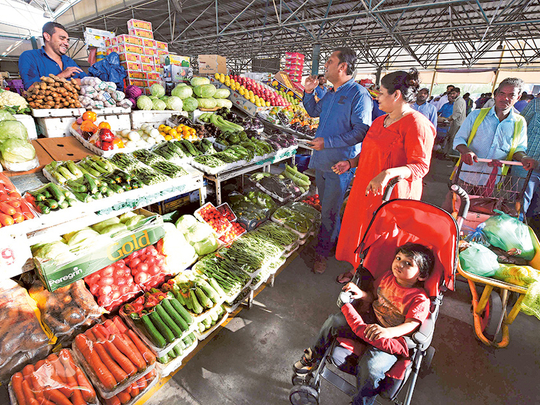
Dubai: Government officials say that all foodstuffs — domestic and imported — consumed in the UAE is rigorously inspected before being released into the market.
Strict inspections are also carried out for feed products for animals that are consumed in the human food chain in the UAE, the Ministry of Climate Change and Environment said.
In a statement, the ministry said that “no food products are released for human or animal consumption unless they comply with local guidelines and standards”.
Majed Mohammad Azmi Naser Al Herbawi, director of Food Safety Department at the ministry, said that food safety is one of the most important pillars of food security in the UAE.
From a legislative perspective, Al Herbawi stated that federal law No 10 (for the year 2015) on food safety calls for strict penalties for violations, including selling adulterated, unsafe or spoilt food and for those who mislead consumers or sell food items that contain ingredients that are not permissible according to Islamic regulations.
Given that the UAE imports more than 80 per cent of its foodstuffs into the country from around the world, proper food inspections at border entry points are critical to ensure optimum national food security, said the ministry on Wednesday.
According to statistics released by the Federal Customs Authority (FCA), in the first six months of 2011, the UAE imported Dh14.7 billion tonnes in basic commodities — including food shipments — worth an estimated Dh186.6 billion.
By commodity category, food imports tracked by the FCA ranged from Dh2.4 billion worth of meat products and Dh2.1 billion in dairy produce, eggs, honey and edible animal products to Dh2.5 billion in fruit, nuts and citrus fruit to Dh1.7 billion in vegetables, roots and tubers.
The ministry said that the country pays great attention to monitoring tools, including increasing the material and human resources at the border entry points and in national laboratories that depend on modern technologies and following best practices. The ministry prohibits the importation of any animal products other than those coming from slaughterhouses that are licensed, subject to field inspections, to ensure that they conform to national, health and religious rules and regulations.
With regard to the feed that is used in the fisheries, Rashid Mohammad Saed Al Shehi, Oceanography Specialist at the ministry, indicated that the ministry seeks to meet the increasing demand for fish and seafood products and ensures that the feed conforms to specified regulations. No animal feed or food products are allowed through the border entry points unless they are accompanied by documents and certificates that ensure that they abide by the local specifications and health regulations.
It is worth noting that the federal law No 10 (for the year 2015) on food safety prohibits carrying out any trade, industrial or professional activity in the UAE that pertains to selling feed, including running facilities for preliminary production before getting the official pre-approval from the local authorities. In addition, manufacturers, producers and importers of feed must register their products before selling them.












